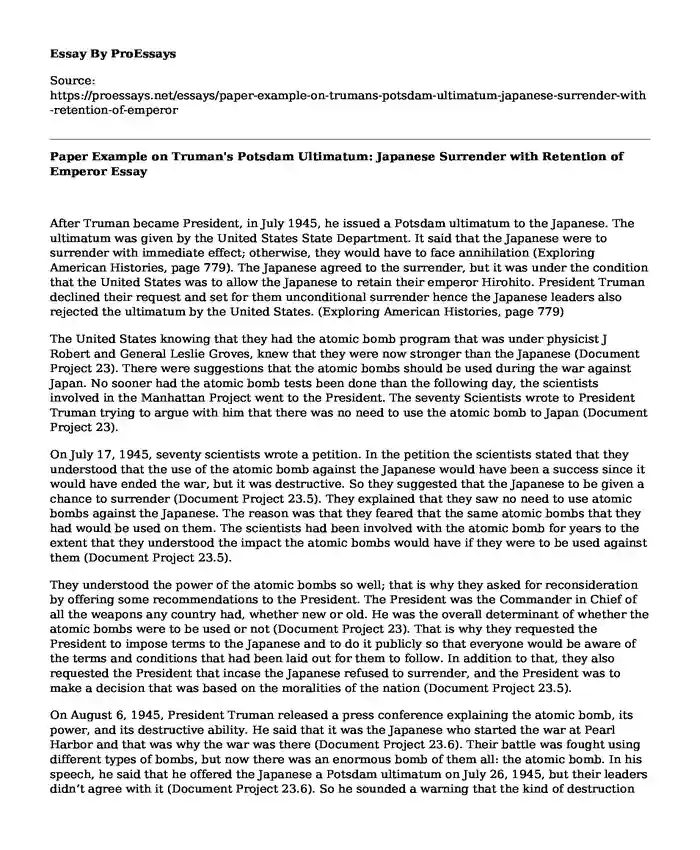After Truman became President, in July 1945, he issued a Potsdam ultimatum to the Japanese. The ultimatum was given by the United States State Department. It said that the Japanese were to surrender with immediate effect; otherwise, they would have to face annihilation (Exploring American Histories, page 779). The Japanese agreed to the surrender, but it was under the condition that the United States was to allow the Japanese to retain their emperor Hirohito. President Truman declined their request and set for them unconditional surrender hence the Japanese leaders also rejected the ultimatum by the United States. (Exploring American Histories, page 779)
The United States knowing that they had the atomic bomb program that was under physicist J Robert and General Leslie Groves, knew that they were now stronger than the Japanese (Document Project 23). There were suggestions that the atomic bombs should be used during the war against Japan. No sooner had the atomic bomb tests been done than the following day, the scientists involved in the Manhattan Project went to the President. The seventy Scientists wrote to President Truman trying to argue with him that there was no need to use the atomic bomb to Japan (Document Project 23).
On July 17, 1945, seventy scientists wrote a petition. In the petition the scientists stated that they understood that the use of the atomic bomb against the Japanese would have been a success since it would have ended the war, but it was destructive. So they suggested that the Japanese to be given a chance to surrender (Document Project 23.5). They explained that they saw no need to use atomic bombs against the Japanese. The reason was that they feared that the same atomic bombs that they had would be used on them. The scientists had been involved with the atomic bomb for years to the extent that they understood the impact the atomic bombs would have if they were to be used against them (Document Project 23.5).
They understood the power of the atomic bombs so well; that is why they asked for reconsideration by offering some recommendations to the President. The President was the Commander in Chief of all the weapons any country had, whether new or old. He was the overall determinant of whether the atomic bombs were to be used or not (Document Project 23). That is why they requested the President to impose terms to the Japanese and to do it publicly so that everyone would be aware of the terms and conditions that had been laid out for them to follow. In addition to that, they also requested the President that incase the Japanese refused to surrender, and the President was to make a decision that was based on the moralities of the nation (Document Project 23.5).
On August 6, 1945, President Truman released a press conference explaining the atomic bomb, its power, and its destructive ability. He said that it was the Japanese who started the war at Pearl Harbor and that was why the war was there (Document Project 23.6). Their battle was fought using different types of bombs, but now there was an enormous bomb of them all: the atomic bomb. In his speech, he said that he offered the Japanese a Potsdam ultimatum on July 26, 1945, but their leaders didn’t agree with it (Document Project 23.6). So he sounded a warning that the kind of destruction that the atomic bomb would bring would usher in a new era. It was then that after the Japanese rejected the ultimatum that he released the first bomb in Hiroshima and three days later another atomic bomb in Nagasaki. Both bombs led to the death of over 200,000 people (Document project 23.7).
Cite this page
Paper Example on Truman's Potsdam Ultimatum: Japanese Surrender with Retention of Emperor. (2023, Oct 03). Retrieved from https://proessays.net/essays/paper-example-on-trumans-potsdam-ultimatum-japanese-surrender-with-retention-of-emperor
If you are the original author of this essay and no longer wish to have it published on the ProEssays website, please click below to request its removal:
- Historical Essay Example: The Rise and Fall of The Roman Empire
- Happiness During American Suburbanization Essay
- Essay Sample on Sudan History
- Essay Sample on Gangs Formation in America
- Paper Example on Gender Roles in American Society: A Preconceived Notion
- Paper Example on American Revolution: A Historical Overview of Military Events & Independence
- Essay on Equiano's Exposed to English Culture: A Life-Changing Encounter







